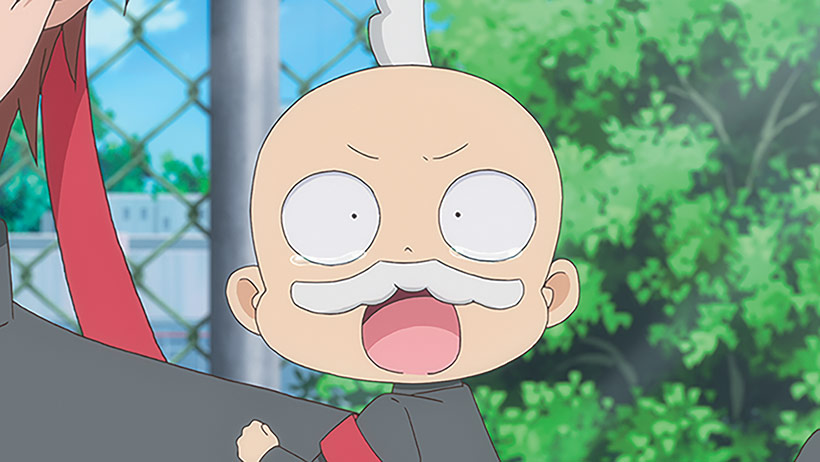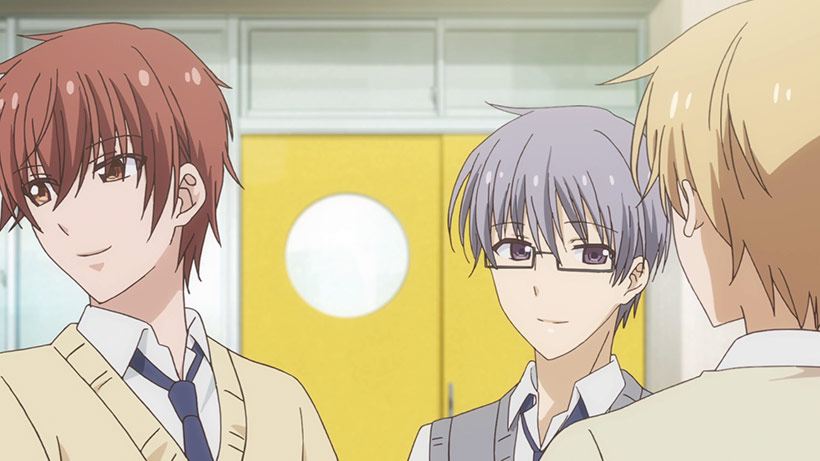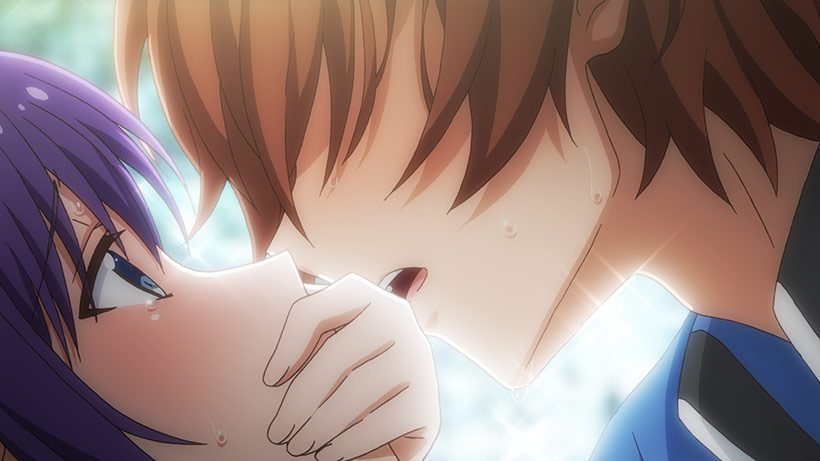Ao-chan Can’t Study! Complete Series promises an interesting concept of navigating the pressures of teenage relationships from the perspective of Ao-chan, whose home life offers a unique vantage point for the series.
At twelve 10-minute episodes, Ao-chan Can’t Study! Complete Series is compact with little room for filler. My initial response to this was genuine surprise as it’s been a while since I’ve jumped into a show with tight running times. This isn’t necessarily a bad thing based on subjective memory – the initial run of Di Gi Charat featured a stack of episodes that ran for under 5 minutes and was deliriously odd. I Can’t Understand What My Husband Is Saying (based on Coolkyousinnjya’s manga series of the same name, the same creator who gave us Miss Kobayashi’s Dragon Maid) excelled in being funny, sweet and at times very genuine in its approach to its subject matter.
While the running time may seem unusual, after seeing this one through I don’t think it would have worked quite as well if if followed the usual 22-minute format without becoming quite lethargic.

The story itself aligns well with the mould – Ao-chan has sworn off pursuing romance with boys because she’s come to the conclusion that guys are more interested in sticking something in and somewhat inept at pursuing a meaningful relationship. She also resents living at home due to the embarrassment of having a father who has built the family’s considerable fortune on the back of being a very successful writer of erotic fiction.
Thus her plan is to study hard in order to get into her school of choice and avoid being distracted by horny young men. By achieving these she can live independently and pursue a more meaningful relationship in her 20s. Like any romcom her plans are challenged by a would-be love interest that results in Ao-chan questioning her resolve in achieving her goals.
I initially wrote off Ao-chan as another ecchi high school drama, but became intrigued by the concept of the show taking a stronger female perspective on love and relationships. After finishing up, I’d say it’s a curious mix of potential.
The female perspective was, for me, what I wanted to see explored. In some respects Ao-chan Can’t Study! presents an interesting view. On one hand, Ao-chan’s disinterest in the opposite sex is presented quite bluntly in the opening episode, and given there’s ongoing evidence to suggest my fellow gender has a problematic relationship with equality and sexuality in broader contemporary society, it’s presented in a way that’s understandable. Ao-chan isn’t just swearing off boys because they suck, but because she sees patterns of behaviour that reflect a sense of entitled patriarchy which all too often fall into presenting women as objects of sexual gratification rather than something more mutually meaningful.
Ao-chan’s stubborn but firm, and the use of this to drive her need to move above the bullshit is admirable.

Then there’s her eccentric father. While not awful he’s incredibly inappropriate. Admittedly he’s a deliberate ridiculous caricature so the inanity is meant to be part of the humour, but it represents some of the problematic nature this series has in execution. It generally doesn’t take much to emphathise with Ao-chan’s need to live independently, though he does have his moments where we see a more measured approach to his character.
Ao-chan’s love interest, Takumi, challenges her perception of the opposite sex. He wears his heart on his sleeve and ardently works to respectfully move beyond the friendzone in pursuing Ao-chan. Some online chatter describe him as unrealistic – in some ways maybe he is, but it’s nice to see he has a backbone when he needs it (so avoiding some of the pitfalls of the hapless male protagonist in teen drama/comedy/slightly ecchi anime) and comes across as being genuinely nice.

Where the anime works really well is in the strength of the protagonist and at times the refreshingly honest approach to sex and relationships. Sex and lust is notoriously and often poorly executed in the atypical teen anime production. There’s either an overload of fan service and “accidental” groping, or it’s sugary sweet without any culmination. Sex of course has been more infamously explored in other anime that take a more seinen approach or those which are clearly playing in the porn space. But for this discussion we’ll keep it to the same paradigm Ao-chan Can’t Study! operates in – the teen anime romantic comedy/drama. There are exceptions to the rule that teen anime can’t meaningfully and honestly explore navigating sex and relationships – His & Her Circumstances is the first that comes to mind and does an amazing job of working through the teen romance paradigm. Utena also famously explores sex, sexuality, relationships and a host of other variables across the TV series and theatrical adaptation. While others don’t immediately come to mind I’m blaming this on my age – a quick Google suggest plenty of options, particularly this set from MyAnimeList.
In the case of Ao-chan Can’t Study! it’s a lot more upfront. It acknowledges and admonishes the shallow pursuit of sex in its first episode and frequently calls it out. There’s upfront discussion of nicking off to a love hotel and the state of your virginity. There’s more than a few scenes of Ao-chan working through occasional fantasies and some general discussion of it between friends as well. The result is an anime that, in many instances, offers a genuinely refreshing and honest discussion around sex and relationships that doesn’t get enough airplay in the broader anime scene.
But then it goes and undoes some of these more progressive elements with tropey gags, like the token beach episode or a scene where Ao-chan is punished for her poor grades by wearing a neko/maid outfit to encourage her to improve her concentration. Her father’s behaviour, while part of his eccentric character, also undermines proceedings as does the clear male gaze that dominates many scenes.
While I’ll butcher this reflection in practice, there’s also the take that Ao-chan’s inability to study are due to a male love interest and that her grades are suffering as a result of her growing feelings. I think in a better environment you could mount a counter-argument that she’s understandably overwhelmed by her feelings and the same could be said for the male characters, but there’s little evidence to suggest a reciprocal experience with Takumi. Some have taken this to suggest an innate inability to balance practical outcomes (study) with emotional needs (desire), a theme that has been problematic in film and TV productions for years.
It would also horrendously fail the Bechdel-Wallace test given the inter-female discussions invariably rest on romance rather than other topics.
All these elements result in a show with truly mixed potential, but there’s also the nagging feeling that perhaps I’m reading into Ao-chan Can’t Study! a little too hard and trying to foist a more seinen (or maybe josei would be more appropriate?) preference for the show doesn’t really fit with the source material or the creators’ intents. I had a similar thought process when watching Chio’s School Road so I accept I might be overanalysing this one. In that respect maybe it’s a case of Ao-chan Can’t Study! is, in practice, a solid high school/teen drama romcom that doesn’t quite reach its potential, and applying a deeper analysis is a little beyond the creator’s scope.

For the local release Madman have done a solid if spartan job with Ao-chan Can’t Study! Complete Series. Given the running time is the equivalent of six 22-minute episodes everything’s comfortably housed on a single disc, the encoding is solid and as a bilingual release you’re covered either way. The only extras are creditless ops and eds.
Despite its shortcomings Ao-chan Can’t Study! Complete Series is definitely worth a look. With some changes here and there it could have truly elevated itself into a better series, but it’s important to note that it was refreshing to see a teen anime tackle sex and relationships a little more honestly than the usual paradigm.
A review copy was provided by Madman Entertainment to the author for the purpose of this review.





